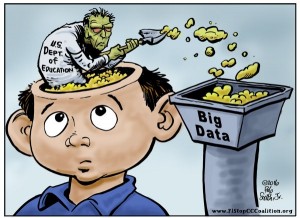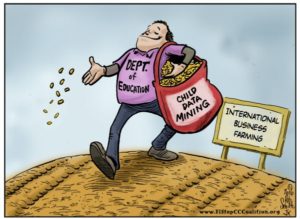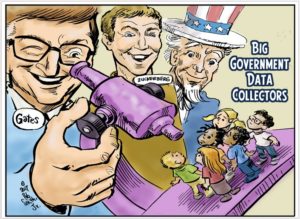Dangerously Flawed “TeenScreen” Mental Health Program Returning to Schools
This article written for The National Pulse by Dr. Karen Effrem takes a look at “TeenScreen” which is a flawed tool used by schools to asses students’ mental health condition.
As the push for more school-based mental health intervention increases after recent high profile school shootings, one particularly controversial and inaccurate mental health screening instrument, “TeenScreen”, is starting to make a comeback. Developed by Dr. David Schaffer and other psychiatrists at Columbia University, TeenScreen is a 14-question computerized survey that was heavily used in as many as 40 states in the early 2000s.
However, the vague and subjective questions used by Teen Screen yielded an astronomical false-positive rate of 84 percent, as admitted by Dr. Schaffer:
The CSS’s positive predictive value of 16% (determined by a weighted prevalence of DISC positive in the sample) would result in 84 nonsuicidal [sic] teens being referred for further evaluation for every 16 youths correctly identified.
One egregious example of TeenScreen’s inaccuracy occurred when an Indiana high school student was forced to take the survey without her parents’ knowledge or consent. As a result of her Teen Screen responses, she was given two psychiatric diagnoses in the hall of the school by a perfect stranger. Because she was studious and did not like to party, she was labeled with social anxiety disorder, and because she liked to keep things clean, she was tagged with obsessive-compulsive disorder. The understandably outraged parents subsequently sued the school and mental-health agency administering TeenScreen.
The lawsuit and surrounding controversy caused the consent procedures to switch from opt-out to opt-in parental consent, resulting in a massive decline in the numbers of children screened (the Indiana school screening the student without parental consent stopping the procedure altogether). This change in consent procedure, the high false-positive rate, and the strong connection between TeenScreen and the pharmaceutical industry were all likely factors in forcing TeenScreen to eventually cease operations of its national program in 2012.
The Dangers of TeenScreen
However, this is unfortunately not the end of the TeenScreen saga. In 2016, Stanford University acquired the rights to the TeenScreen test, and it has been used in some school districts even as recently as the fall of 2018. Even more concerning is recent testimony by Dr. Mark Olfson, current scientific director of whatever is left of TeenScreen at Columbia University, before the federal School Safety Commission in July calling for expansion of “voluntary mental health screening” in an effort to prevent mass shootings such as the one at Parkland, Fla., despite other parts of his testimony rendering that recommendation dangerous and quite illogical:
There are concerns that many young people are being unnecessarily treated with these medications because approximately two-thirds of the increase, the overall increase in psychotropic medication use in youth has occurred among those with less severe or no impairment.
These concerns have focused most intensively on anti-psychotic medications, particularly their use in very young children and children in the foster care system.
He does not realize — or will not admit — that the reason the overall prescription rate increase has occurred in youth with “less severe or no impairment” is due to the promotion and widespread use of mental screening instruments like TeenScreen. Olfson does, however, admit some of the dangerous side effects of the medications:
In addition to uncertainty over the long-term effects on the developing brain, side effects of anti-psychotic medications include weight gain, high cholesterol levels and increased risk of diabetes.
Other severe and life-threatening effects associated with the antipsychotics (studies compiled here) include brain damage, movement disorders, suicide, and a 25-year shortened life span.
In addition, psychiatric experts readily admit that their efforts to predict which patients will become violent are only slightly better than chance, so it is unwise to train already overburdened school staff for a few hours and place this enormous responsibility on them. A psychologist involved in violence-prediction research told the Washington Post, “There is no instrument that is specifically useful or validated for identifying potential school shooters or mass murderers.” Another said in that same article that doing so would endanger both public safety and civil liberties.
Moreover, many experts also rejected the idea of expanded school mental-health screening after the horrific Sandy Hook shooting. A psychiatrist who extensively studied the Sandy Hook shooter told the Los Angeles Times after the Parkland massacre, “But unfortunately, it’s impossible for any of us to predict who is going to go from being troubled and isolated to actually harming others…It really means we can’t rely on prediction and identifying the bad guys. Because we’ll misidentify some who aren’t bad guys, and we’ll fail to identify others who may become bad guys.”
The full article can be viewed on The National Pulse’s website.
The National Pulse – Students’ Privacy Under Serious Threat in Era of School Shootings
This article discusses two federal School Safety Commission meetings dealing with school safety as well as efforts in Florida since the February shooting in Parkland, Florida and how these efforts can and will damage data privacy:
Only one of the three witnesses at the July 11th hearing thought that inappropriate data sharing would hinder students from seeking mental health help. No one discussed the many other dangers of having behavioral and mental health data, especially subjective and often inaccurate screening data collected by minimally trained school personnel reside in longitudinal databases for life. These will be further discussed in a moment.
Another disturbing and related set of developments are the multiple ways that data privacy is being violated in the newly enacted Florida school safety law. These include requiring students to admit any mental health diagnoses, accurate or not, on their beginning-of-year school forms and the new law’s requirement to develop a “centralized integrated data repository and data analytics resource.”
The diagnosis disclosure mandate is a major medical privacy violation, potentially opening students to unwarranted and unwelcome scrutiny by school personnel and law enforcement. Additionally, psychiatric researchers have found that the vast majority (93 percent, according to one study) of the mentally ill will not become violent and that there is no good way to predict which patients will become violent.
The centralized data repository and analytics resource is a euphemism for Big Brother-style monitoring of social media, along with behavioral and mental health data, to allegedly stop threats before they happen. In addition to the grave privacy doubts raised by experts, there is no evidence that this approach even works.
The Miami-Dade school district, neighbor to the Broward district where the Parkland shooting happened, received a $4.6 million grant in 2014 from the U.S. Department of Justice to implement this scheme on a district level. There is now no trace of it on the Miami School Police website. The program ran through the end of 2017 and is being studied by education research company WestEd. Likely possibilities are that the study is not completed yet, the program was a complete failure, or they ran out of money and this new law will be a new funding source. It was extensively described before being taken down
The National Pulse – 6 Key Takeaways from Congress’ Hearing on Protecting Student Data
In this article, Dr. Effrem discusses and highlights aspects of the May 17 congressional hearing regarding student data protection.
1.) More leaders are realizing the need to reduce the amount of student data collected.
By far, the best witness from a parental rights and pro-privacy perspective was David Couch, Chief Information Officer for the Kentucky Department of Education. A former military cyber security expert, his most cogent remarks had to do with decreasing the amount of data collected:
2.) School districts are making a valiant effort to protect data, but it’s a difficult task.
Dr. Gary Lilly of the Bristol, Tenn., school district highlighted various efforts to protect student data. These include background checks on employees and limiting access to data depending on employee role. Both Lilly and Couch discussed the need for more training for teachers and administrative personnel to avoid inadvertently releasing personally identifiable information via spreadsheets or phishing attacks.
3.) The corporate and foundation Big Data interests were well represented.
Amelia Vance, director of education privacy at the Future of Privacy Forum (FPF) was one of the witnesses. FPF is a creation of many of the biggest, worst actors on the privacy front, including the Gates Foundation, Google, and Facebook. She spoke about how necessary it is for taxpayers to spend more money training school districts and corporations to properly protect privacy.
You can view the full article at The National Pulse here.
Education Liberty Watch Co-leads Over 100 Groups Requesting FERPA Rewrite
This week Education Liberty Watch, American Principles Project (APP), and Eagle Forum, along with leaders from more than 100 organizations, both nationally and in 31 states, called on Congress to rewrite the Family Educational Rights and Privacy Act (FERPA). In a letter to the House Education and Workforce Committee, these organizations strongly urged Congress to recognize that it is not the role or right of government to probe a child’s most personal and sensitive attributes, as well as to protect the property interest that citizens have in their personal data.
“General education and labor databases should not be collecting and storing sensitive, subjective social, emotional, psychological and behavioral data,” said Dr. Karen Effrem, a pediatrician, President of Education Liberty Watch, an education writer at APP’s news publication, The National Pulse, and Director of Education for Eagle Forum. “Psychological data related to behavioral, mental health, or special education concerns should be gathered after informed consent and treated with the same care and confidentiality as medical data, with appropriate sharing with law enforcement as needed under current statutes. If this had been done in the Parkland situation, that horrific tragedy could have been avoided.”
“Personal data collection without consent is an affront to freedom,” said Emmett McGroarty, senior fellow at American Principles Project and co-author of the new book, Deconstructing the Administrative State: The Fight for Liberty. “The federal government has no right or authority to vacuum up mountains of personal data on its citizens without their consent, with only the vague intent to “help” them or others make decisions. This is especially true for children.”
The letter submitted five recommendations for the FERPA rewrite:
Do whatever is possible to decrease the amount of data collected on students, especially social-emotional learning (SEL) data. Collection of such data should be eliminated or at the very least a) not collected without informed opt-in parental consent and b) be treated as medical data.
Treat whatever mental health, social emotional, or behavioral data collected for special-education evaluations or any other related program, such as Positive Behavioral Intervention and Supports (PBIS) or Multi-Tiered Systems of Support (MTSS), as medical data that cannot be housed in longitudinal databases.
Use aggregate rather than individual data to the greatest extent possible.
Obtain parental consent if data collected for one purpose is to be repurposed or shared with another federal agency.
Eliminate the current language in FERPA allowing predictive testing.
It is incredibly important to fix FERPA and protect student data and psychological privacy as we have seen on multiple occasions in the recent past:
The Facebook/Cambridge Analytica scandal is affecting students and the Organisation for Economic Cooperation and Development is testing and planning to manipulate the same personality traits in students involved in the Facebook dust-up.
Just this week, there was another major scandal with Pearson committing psychological experiments on college students without consent.
The National Commission on Social, Emotional, and Academic Development is pushing for social emotional learning (SEL) to be involved in school safety issues, which will not help.
Mental screening programs with all of their subjectivity and inaccuracy are starting to pop up all over the country, such as those discussed in Texas.
Efforts to increase data sharing with corporations, researchers and among federal agencies without consent in Congress through the Foundations for Evidence-based Policy Making Act and the College Transparency Act are also being pushed by the data grabbers.
The letter also received excellent coverage by Dr. Susan Berry at Breitbart.
Here is the link to the full letter. Please use it to contact your members of Congress and congressional candidates. so that we may protect the privacy and minds of our children and our freedoms as Americans.
Please also help us continue this David vs. Goliath fight by making your most generous contribution HERE. Thank you!
Issues
- Assessments + Testing (25)
- Bullying/Sex Education (6)
- Child Protection League (2)
- Common Core Standards (78)
- Curriculum + Standards (65)
- Data Collection and Data Privacy (64)
- Early Education/Nanny State (75)
- Federal Education (128)
- International Education (6)
- LGBT Issues in Education (9)
- Media Appearances (4)
- PL/CBE (2)
- Planned Economy (11)
- Politics of Education (26)
- School Violence (9)
- Social Emotional Learning/Mental Health (52)
- State Education (89)
- Testimony/Presentations (17)
- Uncategorized (13)
- Unions (10)
Education Liberty Watch Projects
ELW Allies
- American Principles Project
- Cato Institute
- Conservative Teachers of America
- Constitutional Coalition
- Eagle Forum
- Minnesota Advocates and Champions for Children
- Missouri Education Watchdog
- Restore Oklahoma Parent Empowerment
- Stop Common Core
- The Pioneer Institute
- Truth in American Education
- What is Common Core – Education Without Representation




